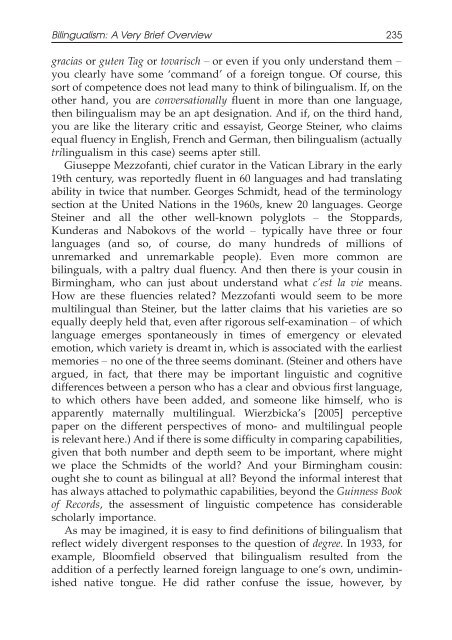Language Diversity in the Classroom - ymerleksi - home
Language Diversity in the Classroom - ymerleksi - home
Language Diversity in the Classroom - ymerleksi - home
- No tags were found...
You also want an ePaper? Increase the reach of your titles
YUMPU automatically turns print PDFs into web optimized ePapers that Google loves.
Bil<strong>in</strong>gualism: A Very Brief Overview 235gracias or guten Tag or tovarisch or even if you only understand <strong>the</strong>m you clearly have some ‘command’ of a foreign tongue. Of course, thissort of competence does not lead many to th<strong>in</strong>k of bil<strong>in</strong>gualism. If, on <strong>the</strong>o<strong>the</strong>r hand, you are conversationally fluent <strong>in</strong> more than one language,<strong>the</strong>n bil<strong>in</strong>gualism may be an apt designation. And if, on <strong>the</strong> third hand,you are like <strong>the</strong> literary critic and essayist, George Ste<strong>in</strong>er, who claimsequal fluency <strong>in</strong> English, French and German, <strong>the</strong>n bil<strong>in</strong>gualism (actuallytril<strong>in</strong>gualism <strong>in</strong> this case) seems apter still.Giuseppe Mezzofanti, chief curator <strong>in</strong> <strong>the</strong> Vatican Library <strong>in</strong> <strong>the</strong> early19th century, was reportedly fluent <strong>in</strong> 60 languages and had translat<strong>in</strong>gability <strong>in</strong> twice that number. Georges Schmidt, head of <strong>the</strong> term<strong>in</strong>ologysection at <strong>the</strong> United Nations <strong>in</strong> <strong>the</strong> 1960s, knew 20 languages. GeorgeSte<strong>in</strong>er and all <strong>the</strong> o<strong>the</strong>r well-known polyglots <strong>the</strong> Stoppards,Kunderas and Nabokovs of <strong>the</strong> world typically have three or fourlanguages (and so, of course, do many hundreds of millions ofunremarked and unremarkable people). Even more common arebil<strong>in</strong>guals, with a paltry dual fluency. And <strong>the</strong>n <strong>the</strong>re is your cous<strong>in</strong> <strong>in</strong>Birm<strong>in</strong>gham, who can just about understand what c’est la vie means.How are <strong>the</strong>se fluencies related? Mezzofanti would seem to be moremultil<strong>in</strong>gual than Ste<strong>in</strong>er, but <strong>the</strong> latter claims that his varieties are soequally deeply held that, even after rigorous self-exam<strong>in</strong>ation of whichlanguage emerges spontaneously <strong>in</strong> times of emergency or elevatedemotion, which variety is dreamt <strong>in</strong>, which is associated with <strong>the</strong> earliestmemories no one of <strong>the</strong> three seems dom<strong>in</strong>ant. (Ste<strong>in</strong>er and o<strong>the</strong>rs haveargued, <strong>in</strong> fact, that <strong>the</strong>re may be important l<strong>in</strong>guistic and cognitivedifferences between a person who has a clear and obvious first language,to which o<strong>the</strong>rs have been added, and someone like himself, who isapparently maternally multil<strong>in</strong>gual. Wierzbicka’s [2005] perceptivepaper on <strong>the</strong> different perspectives of mono- and multil<strong>in</strong>gual peopleis relevant here.) And if <strong>the</strong>re is some difficulty <strong>in</strong> compar<strong>in</strong>g capabilities,given that both number and depth seem to be important, where mightwe place <strong>the</strong> Schmidts of <strong>the</strong> world? And your Birm<strong>in</strong>gham cous<strong>in</strong>:ought she to count as bil<strong>in</strong>gual at all? Beyond <strong>the</strong> <strong>in</strong>formal <strong>in</strong>terest thathas always attached to polymathic capabilities, beyond <strong>the</strong> Gu<strong>in</strong>ness Bookof Records, <strong>the</strong> assessment of l<strong>in</strong>guistic competence has considerablescholarly importance.As may be imag<strong>in</strong>ed, it is easy to f<strong>in</strong>d def<strong>in</strong>itions of bil<strong>in</strong>gualism thatreflect widely divergent responses to <strong>the</strong> question of degree. In 1933, forexample, Bloomfield observed that bil<strong>in</strong>gualism resulted from <strong>the</strong>addition of a perfectly learned foreign language to one’s own, undim<strong>in</strong>ishednative tongue. He did ra<strong>the</strong>r confuse <strong>the</strong> issue, however, by
















